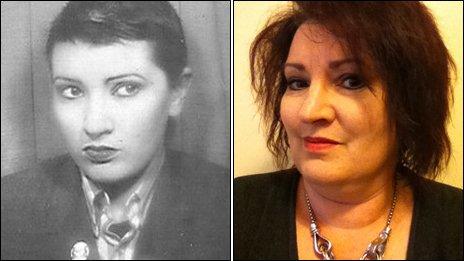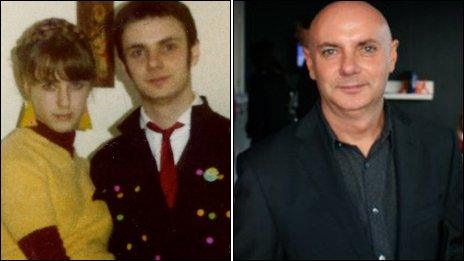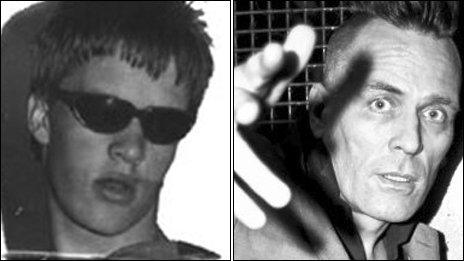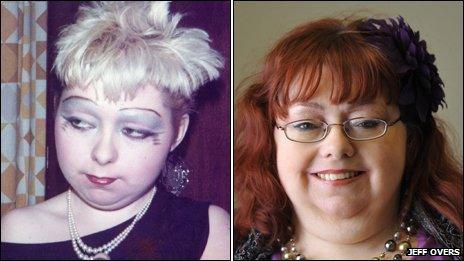Punks of '77: Still angry after all these years?
- Published
Music journalist and Editor of Uncut, Allan Jones, was invited to join the Sex Pistols aboard their Silver Jubilee boat trip
Back in the early summer of 1977, British punks snarled their protest against the establishment as the nation prepared for the Queen's Silver Jubilee celebrations. So how do those same punks feel about the Royal Family now?
"I was against the Silver Jubilee, against the symbolism and the money being spent on the festivities. My friends and I thought the royals could afford to pay for the party themselves."
Louise Bolotin is a 50-year-old writer living in Manchester, who in 1977 was a 15-year-old living in Edinburgh.
She marked that year's celebrations by wearing her "Stuff the Jubilee" badge all day.
Her attitude typifies those following the punk movement at that time. Although the nation had been encouraged to have a party in honour of the Queen, not everyone wanted to come.
The rising popularity of the punks provided a snarling, spitting, sometimes swearing outlet for some of the angry youths disillusioned with 1970s Britain - a time of strikes, economic hard times and high unemployment.

A teenage Louise Bolotin wore a "Stuff the Jubilee" badge for the 1977 Silver Jubilee and her attitude towards the Diamond Jubilee is the same
So as the Queen prepares to celebrate her 60th year on the throne, what do these now middle-aged punks from 1977 think of the Diamond Jubilee, and of the Royal Family?
The 35 years that have passed since she proudly wore her badge have not altered Louise's attitude to the Jubilee concept, which remains "stuff it".
"I know the government say we need something to cheer us up, but I'd rather they saved the money for the celebrations and didn't carry out swingeing public sector cuts."
Louise says her fellow punks later worked in publishing, became professional musicians, photographers and one became "professional muscle" by doing venue security work.
"There are definitely parallels between the national mood in 1977 and now. Both had rising unemployment, a hardline government, a screwed economy, and there was general restlessness and anger."
Author Jon Savage has documented the history of the punk movement and says punks in 1977 were "super-heated" about the Jubilee being "vaguely fascist, and a return to a past that had never really existed".
"This was enthusiastically backed by the media, in which almost no dissent against the Jubilee was allowed."
Testament to that, he says, was that the song God Save The Queen by the Sex Pistols, released at the time of the Silver Jubilee, was widely banned, including by the BBC.
The song certainly gave punks an anthem. Jon says that "if you were against the Jubilee, you could go out and buy that record as a form of protest and its popularity showed there were lots of people who didn't believe the hype".
Famously, the Sex Pistols performed God Save The Queen and other songs on 7 June 1977 while sailing down the River Thames and Jon was one of those on board., external The event, intended to mock the Queen's river procession planned for two days later, ended chaotically.
God Save The Queen has now been re-released for the Diamond Jubilee, but the band's frontman John Lydon has distanced himself from it, saying its re-release totally "undermines what The Sex Pistols stood for".
Among those who had the single first time around was Nigel Godfrey, a 16-year-old at the time of the Silver Jubilee, and known to fellow punks as Smartie Boy because of his dress sense.
He now lives in Birmingham but was in Stapleford, Nottingham, in 1977 - and unimpressed with the efforts made by the mothers on his council estate, who mobilised themselves and arranged a Jubilee street party "right outside our windows".
Nigel and his sister Cheryl, known as Smartie Girl, made their feelings known by blaring out punk music all day, including the Sex Pistols and the Damned - and God Save The Queen in particular. The Pistols' version, of course.

Nigel Godfrey was known as Smartie Boy in 1977, and his sister Cheryl was known as Smartie Girl, because of their outfits
"I was very anti the celebrations and so was my sister, so we refused to attend the party until about 2pm when the food was served. Then we went down, sat on the long tables with the other kids and played a game of how much food could we stuff into our pockets."
Nigel, now 50 and a business adviser for a local authority, says he hated the monarchy in 1977. "No-one had much money but they were seen to be wealthy and I didn't agree with people having that much wealth.
"They weren't going to jumble sales and buying clothes like the rest of us."
As for this year's Diamond Jubilee, Nigel says he is "not interested" and will spend the weekend of the Diamond Jubilee "playing my punk records and not switching on the television all day".
This attitude, says Jon Savage, mirrors the general attitudes of punks towards the Silver Jubilee, for whom those celebrations induced feelings of "boredom, of irritation bordering on hostility".
"The Jubilee in 1977, as now, seemed to have nothing to do with what was actually going on in society, which had rising unemployment and decaying inner cities," he said.
"My attitude to the Jubilee now hasn't changed at all. It's disinterest, moving towards irritation. The recent fawning in the media over Prince Harry makes me feel sick."
Sharing in this anti-monarchist sentiment is John Robb, 50, from Manchester, who was a 16-year-old punk in Blackpool at the time of the Silver Jubilee.
Now a music writer, broadcaster and vocalist for punk band Goldblade, he says he was involved with the craze for "nicking Union Jacks from flagpoles" which was going round his school back then.

John Robb has been a punk for most of his life and, as a teenager, stole Union Jack flags from flagpoles around the time of the Silver Jubilee
"In 1977 the Royal Family didn't have as good PR as they do now. They were seen as dusty old relics and I had the feeling that they wouldn't be around much longer.
"There weren't many street parties and it all seemed to be forced jollity."
John says the current Royal Family "unfortunately" do not seem like "dusty old relics" because they have "some of the best PR working for them and a younger generation who seem like normal people".
He says he is going to ignore the Diamond Jubilee but stresses that he does not hate the royals.
"I just think the people who like them should be the ones to pay for them."
Another punk who hasn't altered her opinions over the years is 50-year-old Penny Pepper. She was a 16-year-old punk in 1977, in a long-term rehabilitation hospital in Berkshire. She has been a wheelchair user since the age of 12.
"I was a bedroom punk, as I couldn't get out much and relied on my brother to feed me punk records. I listened to John Peel, who was God to many of us, on my transistor radio.
"We had a Jubilee party in the hospital ward, which I was not remotely interested in attending. We did used to play God Save The Queen and scream out the line 'fascist regime' whenever the most hated nurse walked past."

Penny Pepper was known by a variety of punk names, including Kat Kolbert, Kat Dekadent, Kata Kruel and Lydia Pigmy
She is now a writer and spoken word performer living in Islington, and confides a secret about herself: "My second name is Anne, as I was named after Princess Anne."
Despite this, she's still not a fan of the royals.
"The whole monarchy idea sickens me. I don't hate individuals but I hated the institution, and still do to this day."
As for Louise Bolotin, she too has mostly kept her anti-monarchist opinions.
"I still think the royals are a large waste of public money but at least they are paying some taxes now and the civil list has been heavily pruned - both of which are right.
"My views about them being a draw for tourists and thus good for the economy have softened - only very slightly, mind - with age. I would never have admitted that in 1977.
"But I still say 'off with their heads' and still think they're over-indulged parasites. I'm a republican till I die."